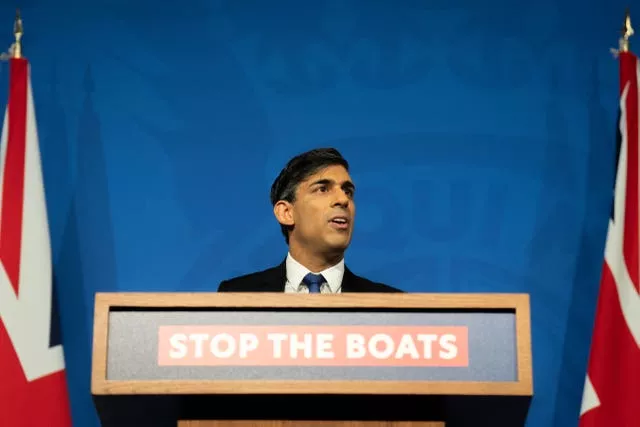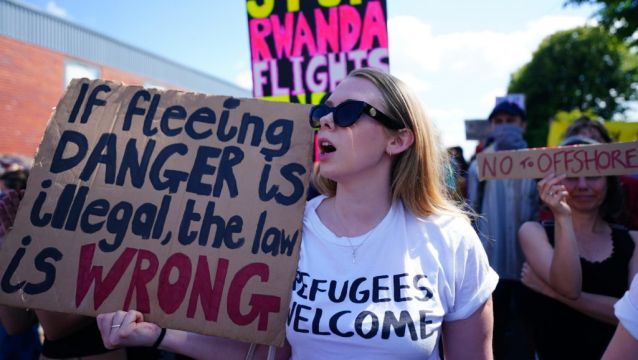British prime minister Rishi Sunak is under pressure from both wings of his party over his bid to ensure migrants can be removed to Rwanda.
Flagship legislation combined with a new treaty declaring Rwanda a safe country was sold as a fair yet robust response to the Supreme Court ruling that his plan was unlawful.
However, perceived flaws in the Safety of Rwanda (Asylum and Immigration) Bill has reignited Tory divisions with Mr Sunak caught in the middle as both those on the right and centrists question his approach.
MPs are considering their options ahead of the first crucial Commons vote on the Bill on Tuesday.
Meanwhile, speculation is rife over a possible rebellion and Mr Sunak’s position has been called into question.
– Why is the Safety of Rwanda (Asylum and Immigration) Bill causing problems for the British prime minister?

Simply put, the Conservative right does not believe the legislation goes far enough and will not ensure the Rwanda plan is implemented as intended, while more moderate MPs are concerned it could go too far and compromise the UK’s human rights credentials and obligations under international law.
This dynamic, which has left the UK prime minister vulnerable to pressure from both flanks of the party, has emerged as a result of Mr Sunak trying to avoid potential tensions by pursuing what has been described as a “middle way”.
This was evident in the Bill’s combination of moderation, which would leave some options open for legal challenges to migrants being flown to Rwanda, with a more hardline stance that could put the UK in breach of its treaty obligations and the European Convention on Human Rights in particular.
The approach has clearly backfired, with pragmatism serving only to please a few and anger many.
– What is happening in the Conservative Party and why?

MPs on the Tory right tend to consider strong immigration policy as key to reviving the party’s fortunes, and they currently appear to have little appetite for compromise.
The bottom line is that these MPs, including former home secretary Suella Braverman, want to remove all loopholes that enable Rwanda removals to be challenged in the courts.
Robert Jenrick, a former close ally of the Mr Sunak who resigned as immigration minister last week, is among those who have said they cannot support the legislation in its current form.
Mr Jenrick’s claim that the Bill can be “fixed” suggests either a willingness to negotiate or some potential for a damaging battle over what he described as a “better way”.
Ominously for the UK prime minister, different factions on the right, including MPs who are not afraid to cause disruption, have coalesced on the issue.
Hardline Brexiteers from the European Research Group and other tribes with a shared interest will first hold a summit on Monday to consider the legislation and how asylum policy can be revived.
A “star chamber” of lawyers advising the ERG has already said the Bill needs “very significant amendments”.
The right may be well organised and determined, but moderate One Nation Tories are greater in number.
This does not mean Mr Sunak is protected from challenge and he is now in a position where he must tread very carefully if he is to maintain authority.
These MPs on the more moderate wing of the party will hold a separate evening meeting in Parliament on Monday before releasing a statement on their view of the Bill.
– What are the next steps for the Bill in Parliament?

The second reading of the Safety of Rwanda (Asylum and Immigration) Bill takes place on Tuesday.
To avoid defeat, the British prime minister will need to restrict abstentions to below 56 or limit votes against to 28.
The British government has said the Bill will be emergency legislation, meaning it will be fast-tracked through both Houses.
Some emergency legislation has been passed within a few days, but there is no set timeframe for its progress.
There are no special procedures to pass emergency legislation. However, in normal circumstances the Lords will agree to pass an emergency Bill quite quickly.
It remains to be seen whether this will be the case with such a contentious piece of legislation and the Lords is under no obligation to do so.
As with any Bill, there will be opportunities for both the Commons and the Lords to delay or block the legislation.
The British government does not have a majority in the Lords and there has been plenty of appetite for peers to make life difficult for ministers in recent years.
Parliament data shows the British government has been defeated in the Lords 360 times since the 2019 general election.
The profile and focus of the legislation suggests there could be significant concerns in the Upper House over its contents, which could lead to delays.
The Government cannot control the timetable in the Lords and any amendments would have to be removed by the Government as the Bill rebounds between the two Houses during the final “ping-pong” stages.
– What do the current Tory tensions mean for Rishi Sunak’s future?

The re-emergence of internal Tory discord following a prolonged period of instability in the parliamentary party means speculation about the Prime Minister’s future is inevitable.
Mr Sunak’s flagship legislation on an issue many in his party see as crucial to their electoral prospects is clearly in trouble at a time when polls are showing no signs of narrowing.
There are some MPs who will embrace an opportunity to destabilise the British prime minister as they seek to install a candidate who is popular on the right and among the Tory grassroots.
Yes, expect this to include speculation over the return of Boris Johnson to Parliament or even a leadership bid by Liz Truss.
However, the large proportion of MPs on the left of the party who are unlikely to welcome a plot against the Prime Minister suggests the chances of a serious leadership challenge are remote.
Damian Green, leader of the One Nation group of MPs and former de-facto deputy deputy prime minister, described those who want to remove Mr Sunak as mad or malicious, or both”.
But the chaos and instability surrounding recent Tory prime ministers means a challenge cannot be ruled out.
– Will the prime minister’s challenges influence the timing of the next UK general election?

With the Conservatives polling so poorly, it is difficult to see how calling a general election in the early part of next year makes sense.
With the tricky immigration issue unresolved, many voters still struggling with the cost of living and less-than-optimistic economic forecasts, Tory MPs would expect to find it challenging when making their case on the doorstep.
In the event of Mr Sunak being ousted, a third unelected prime minister since the last election would be installed.
This level of instability would be likely to leave a new prime minister hamstrung as they face major, complex challenges and try to turn the UK government’s fortunes around.
levelling up secretary Michael Gove has said that ministers are not considering calling a general election if the Government fails to get the Bill through Parliament.
Mr Sunak has also said the vote on his Bill will not be a “confidence matter”, meaning Tory MPs who vote against it will not be thrown out of the party, and he will not be obliged by convention to call an election if he loses the vote.







